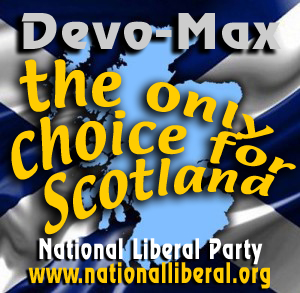NLP Submission to the Scottish Government
 THE National Liberal Party will soon be contacting Alex Salmond concerning the proposed draft Scottish Constitutional Referendum Bill.
THE National Liberal Party will soon be contacting Alex Salmond concerning the proposed draft Scottish Constitutional Referendum Bill.
David Kerr – pictured left – a member of the NLPs Steering Committee – has been tasked with drawing up our submission to the Scottish Government. This is the body which will consider all details and options relating to the vote on Scotland’s future.
The NLPs submission is likely to focus on two main areas.
The first is the need to have a truly democratic vote. As it stands at the moment, this is not possible as Scots will only be allowed to choose between two options. These are independence and the union.
 We feel that this is unfair and unjust. The NLP believes that at least one other option should be provided. This ‘third option’ would be Devo-Max, an idea which is gaining ground in Scotland. (Briefly, Devo-Max will keep Scotland in the United Kingdom but it’ll have the power to raise and spend its own money. Westminster will only look after ‘UK wide’ services like Defence and Foreign Affairs. The NLP believes that Devo-Max is an important option that many people would prefer.)
We feel that this is unfair and unjust. The NLP believes that at least one other option should be provided. This ‘third option’ would be Devo-Max, an idea which is gaining ground in Scotland. (Briefly, Devo-Max will keep Scotland in the United Kingdom but it’ll have the power to raise and spend its own money. Westminster will only look after ‘UK wide’ services like Defence and Foreign Affairs. The NLP believes that Devo-Max is an important option that many people would prefer.)
To this end the National Liberal Party is busy campaigning in Scotland on the issue of having a ‘third option’ on the ballot paper.
The second objective of our submission will be to raise the idea of a Scottish Preferendum – as opposed to a Scottish Referendum.
A preferendum is a multi-option voting process for use in decision-making. The procedures for a preferendum cover both the debate which precedes the vote, as well as the vote-and-count. A referendum, on the other hand, is a direct vote in which an entire electorate are asked to either accept or reject a particular proposal.
Although they may sound similar, a preferendum is much more democratic that a referendum. A preferendum also ensures that more people are happier with the eventual outcome. Here’s how:
Say the Scottish Referendum only allows people to vote for one of two choices. At the moment that’s either independence or remaining part of the union. Even if a majority – say 51 per-cent voted for the union – that leaves a sizeable minority (49%) opposing it.
Additionally, if the Scottish Referendum included Devo-Max on the ballot paper, many people can also be left bitterly disappointed.
Say 31 per–cent of Scots vote for the union. 30 per-cent may vote for Devo-Max and 29% for independence. Here it can be seen that overwhelming majority (59 to 31%) have voted against union.
With a referendum, the largest minority wins! Such a referendum can’t really be said to truly reflect the mood of a country. It can’t really be said to be a truly democratic vote.
However, in a preferendum, the electorate can cast a vote in favour of a whole spectrum of ideas.
Say there are three options – the union, Devo-Max and independence. The voter can cast 3 points for their most preferred option, 2 points for their next favourite and 1 point for their last choice.
At the count, all the points for each of the options shall be totaled and expressed as a percentage of the maximum possible score as a level of consensus. The option which gets the greatest number of first preference votes wins.
The National Liberal Party feels that this would be a much more democratic way of conducting business. It leaves the vast majority of people happy – and, importantly, less people will feel cheated.
As we noted in a previous article – Scottish Update of 24 March 2012 – those interested in helping out with the NLPs submission should contact us at natliberal@aol.com as soon as possible.
We hope to have our submission in towards the end of this month, so look out for more news on this in the very near future.
In the meantime, information about Preferendums can be found here: http://www.deborda.org/faq/what-is-a-preferendum/
• Follow the National Liberal Party on Twitter. Just click here: https://twitter.com/#!/national_libera
• Follow the National Liberal Party on You Tube. Just click here: http://www.youtube.com/user/NationalLiberalParty
• Follow the National Liberal Party on Facebook. Just click here: http://www.facebook.com/pages/National-Liberal-Party/160937907279184
Date: April 9, 2012
Categories: Party News, UK News































